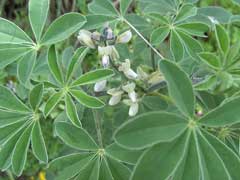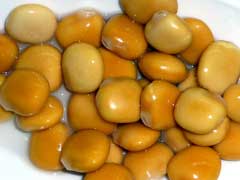 |
|
http://picasaweb.google.com/lh/photo/LjRzmSg06G9D4k-q5L8YUA |
 |
|
Translate this page:
Summary
Many Lupinus species are nitrogen-fixers, helping improve soil fertility. Some Lupinus species are adapted to dry conditions, have drought tolerance, and tolerate poor soil. Lupines are especially attractive to bees and butterflies. The flowers produce abundant nectar and pollen, providing a valuable food source. Birds are attracted to lupines for the seeds, which ripen in pods later in the season. The annual White Lupin (L. albus) and Yellow Lupin (L. luteus) seeds must be appropriately processed (soaked and boiled) to reduce alkaloid content before consumption.
Physical Characteristics

 Lupinus albus is a ANNUAL growing to 1.2 m (4ft) by 0.3 m (1ft in) at a medium rate.
Lupinus albus is a ANNUAL growing to 1.2 m (4ft) by 0.3 m (1ft in) at a medium rate.
See above for USDA hardiness. It is hardy to UK zone 7. It is in flower from June to July, and the seeds ripen from August to September. The species is hermaphrodite (has both male and female organs) and is pollinated by Bees. The plant is self-fertile.
It can fix Nitrogen.
It is noted for attracting wildlife.
Suitable for: light (sandy) and medium (loamy) soils. Suitable pH: mildly acid, neutral and basic (mildly alkaline) soils and can grow in very acid soils.
It cannot grow in the shade. It prefers moist soil.
UK Hardiness Map
US Hardiness Map
Synonyms
L. sativus. L. termis.
Plant Habitats
Cultivated Beds;
Edible Uses
Edible Parts: Oil Oil Seed
Edible Uses: Coffee Oil Oil
Seed - cooked[2, 7, 50, 105, 132]. Used as a protein-rich vegetable or savoury dish in any of the ways that cooked beans are used, they can also be roasted or ground into a powder and mixed with cereal flours in making bread etc[183]. If the seed is bitter this is due to the presence of toxic alkaloids and the seed should be thoroughly leached by soaking it and then discarding the soak water before cooking[132]. Seeds contain 32 - 40% protein, 8 - 12% oil[160]. The roasted seeds can be used as a snack in much the same way as peanuts[183]. An edible oil is obtained from the seed[4, 7]. The roasted seed is used as a coffee substitute[7, 61, 105, 183].
References More on Edible Uses
Medicinal Uses
Plants For A Future can not take any responsibility for any adverse effects from the use of plants. Always seek advice from a professional before using a plant medicinally.
Diuretic Emmenagogue Hypoglycaemic Vermifuge
The seeds, taken internally, are diuretic, emmenagogue, hypoglycaemic and vermifuge[4, 7]. When bruised and soaked in water they are used as a poultice on ulcers etc[4].
References More on Medicinal Uses
The Bookshop: Edible Plant Books
Our Latest books on Perennial Plants For Food Forests and Permaculture Gardens in paperback or digital formats.

Edible Tropical Plants
Food Forest Plants for Hotter Conditions: 250+ Plants For Tropical Food Forests & Permaculture Gardens.
More

Edible Temperate Plants
Plants for Your Food Forest: 500 Plants for Temperate Food Forests & Permaculture Gardens.
More

More Books
PFAF have eight books available in paperback and digital formats. Browse the shop for more information.
Shop Now
Other Uses
Cosmetic Fibre Green manure Oil Oil
The seed contains up to 12% oil. This is used in making soap[7]. A fibre obtained from the stems is used for making cloth etc[4]. A cosmetic face-mask can be made from lupin flour, this is used to invigorate tired skin[7]. A useful spring-sown green manure crop, especially on light soils. It is deep rooting, fairly fast growing, produces a good bulk and fixes atmospheric nitrogen[7, 46, 61, 87]. Dynamic accumulator.
Special Uses
Dynamic accumulator Nitrogen Fixer
References More on Other Uses
Cultivation details
An easily grown plant, succeeding in any moderately good soil. It prefers a light acid soil but tolerates adverse conditions[87]. Requires a sunny position[200]. The white lupin is sometimes cultivated, especially in S. Europe, for its edible seed[50] and also as a green manure crop[4]. There are some named varieties, many of which have bitter seeds that contain toxic alkaloids and require leaching before they are eaten but some sweet varieties have also been developed[183]. These sweet varieties are perfectly wholesome as food for humans and include the cultivar 'Kiev'[183]. There is some confusion between this species and L. nanus[1]. A deep rooting plant[87]. This species has a symbiotic relationship with certain soil bacteria, these bacteria form nodules on the roots and fix atmospheric nitrogen. Some of this nitrogen is utilized by the growing plant but some can also be used by other plants growing nearby[200]. When removing plant remains at the end of the growing season, it is best to only remove the aerial parts of the plant, leaving the roots in the ground to decay and release their nitrogen. Lupinus albus, commonly known as white lupin, is generally suited to USDA Hardiness Zones 6 through 9 when grown as an annual crop, although it can sometimes be cultivated in Zone 5 with a long enough growing season and protection from late frosts.
It is a cool-season legume that prefers mild temperatures and does not tolerate extreme heat or prolonged frost. Ideal temperatures for growth range between 50–75°F (10–24°C). In warmer climates, it’s typically grown over the cooler months, while in cooler climates it’s planted in spring after the last frost. Though not frost-hardy once mature, it can handle cool soils at germination and is sometimes fall-sown in Mediterranean climates.
References Carbon Farming Information and Carbon Sequestration Information
Temperature Converter
Type a value in the Celsius field to convert the value to Fahrenheit:
Fahrenheit:
The PFAF Bookshop
Plants For A Future have a number of books available in paperback and digital form. Book titles include Edible Plants, Edible Perennials, Edible Trees,Edible Shrubs, Woodland Gardening, and Temperate Food Forest Plants. Our new book is Food Forest Plants For Hotter Conditions (Tropical and Sub-Tropical).
Shop Now
Plant Propagation
Pre-soak the seed for 24 hours in warm water and sow in mid spring in situ[1, 200]. You may need to protect the seed from mice. Germination should take place within 2 weeks.
Other Names
If available other names are mentioned here
Native Range
TEMPERATE ASIA: Turkey (west) EUROPE: Former Yugoslavia, Albania, Bulgaria, Greece (incl. Crete)
Weed Potential
Right plant wrong place. We are currently updating this section.
Please note that a plant may be invasive in one area but may not in your area so it's worth checking.
Conservation Status
IUCN Red List of Threatened Plants Status :

Growth: S = slow M = medium F = fast. Soil: L = light (sandy) M = medium H = heavy (clay). pH: A = acid N = neutral B = basic (alkaline). Shade: F = full shade S = semi-shade N = no shade. Moisture: D = dry M = Moist We = wet Wa = water.
Now available:
Food Forest Plants for Mediterranean Conditions
350+ Perennial Plants For Mediterranean and Drier Food Forests and Permaculture Gardens.
[Paperback and eBook]
This is the third in Plants For A Future's series of plant guides for food forests tailored to
specific climate zones. Following volumes on temperate and tropical ecosystems, this book focuses
on species suited to Mediterranean conditions—regions with hot, dry summers and cool, wet winters,
often facing the added challenge of climate change.
Read More
Expert comment
Author
L.
Botanical References
50200
Links / References
For a list of references used on this page please go here
Readers comment